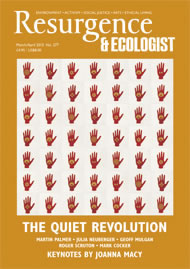From the demands of mining companies to large-scale illegal fishing operations, India’s villages and coastlines are being subsumed in the rush towards big business. As the seemingly relentless global demand for material goods, food and fuel began to strip ever more communities of both land and livelihood, rural people – who had been cheated of their land at every turn – remained invisible to those in power and seemed powerless in the wake of the encroaching industrialisation.
Not any more.
Thanks to the activism of Ekta Parishad – India’s largest people’s movement – the people are finally finding their collective voice.
In October 2012, on the anniversary of Mahatma Gandhi’s birthday, some 50,000 landless people gathered on a dusty strip of land in the city of Gwalior. Their mission was called March for Justice. As they embarked on a 350km march to Delhi, their aim was simple: to force the Indian government to revise the country’s laws and ensure that poor people have access to the land, forest and water they rely on.
The mass action was the culmination of six years’ work by Ekta Parishad. Under the leadership of founder Rajagopal, this umbrella organisation linking hundreds of small campaigns across India has ratcheted up the pressure on India’s ruling party through a series of similar marches.
At first Ekta took little steps. In 2006, just 500 activists walked from Gwalior to Delhi as a warning to the government. When they received no response, they began to stride. One year later their marching ranks had grown to 25,000. Sleeping rough on the roadsides and eating just one meal a day, on they marched through rural India, waving the movement’s distinctive green and white flag.
The 2007 action, which was called Janadesh, reaped some important gains. For example, the Forest Rights Act was passed, giving forest-dwelling communities the opportunity to legally claim ownership of land they had been living on for generations. Its implementation, however, has been disappointing, with more claims rejected than approved.
In addition, the National Land Reform Committee was established in 2008 to look at land disputes the length and breadth of India. Its findings were to be implemented by the National Council for Land Reforms, headed by the prime minister. To date, that council has never met.
Bitterly disappointed by this refusal to take any real action, Ekta decided to let its feet do the talking once more. From the same ground in Gwalior city and armed with fresh stories of struggle, the marchers trod the same worn path to Delhi. This time they were stopped in their tracks. Under the shadow of the Taj Mahal in Agra, rural development minister Jairam Ramesh halted the march and committed the Indian government, there and then, to Ekta’s demand for a National Land Reforms Policy. He also promised that landless people would have a legal right to agricultural land and that homestead land would be given to homeless people.
It remains to be seen whether the Indian government really will deliver on its promises, but after five years of steady defiance there is one clear victory and that is that the voices of 50,000 poor and landless people joined together in peaceful protest have been heard. This in itself is testament to the tool of non-violent protest turning weakness into strength.
But across the subcontinent, the space for non-violent action is constantly being squeezed. In India’s silent civil war, the rural poor are turning to armed struggle to protect themselves. Used as pawns by guerrilla groups such as the Maoists, they are encouraged to take up weapons. In response, the government is mobilising its military force. Through violent conflict, Ekta Parishad believes, change may be achievable but it is not sustainable.
It’s a theme that is increasingly being reflected worldwide. In Africa and South America similar land grabs are under way, decimating communities and those least able to defend themselves. Little or no compensation is offered to men and women who often end up migrating to the cities to beg. In Africa, a reported 203 million hectares has now changed hands in mainly secretive land deals.
From the southernmost tip of Kerala to Kashmir in the north, the Ekta Parishad marchers covered more than 80,000km, listening, as they walked, to the miserable realities of the lives of thousands of poor people. With each step the protesters gathered a new story, and with each kilometre they called on all India’s poor to join together and use non-violence in protest. And in so doing, the ongoing story of Ekta Parishad and its brave marchers can now light the way as a blueprint for protest and a beacon for real change.
To keep the pressure on the Indian government, Ekta Parishad needs your support. If you would like to help, email [email protected]








